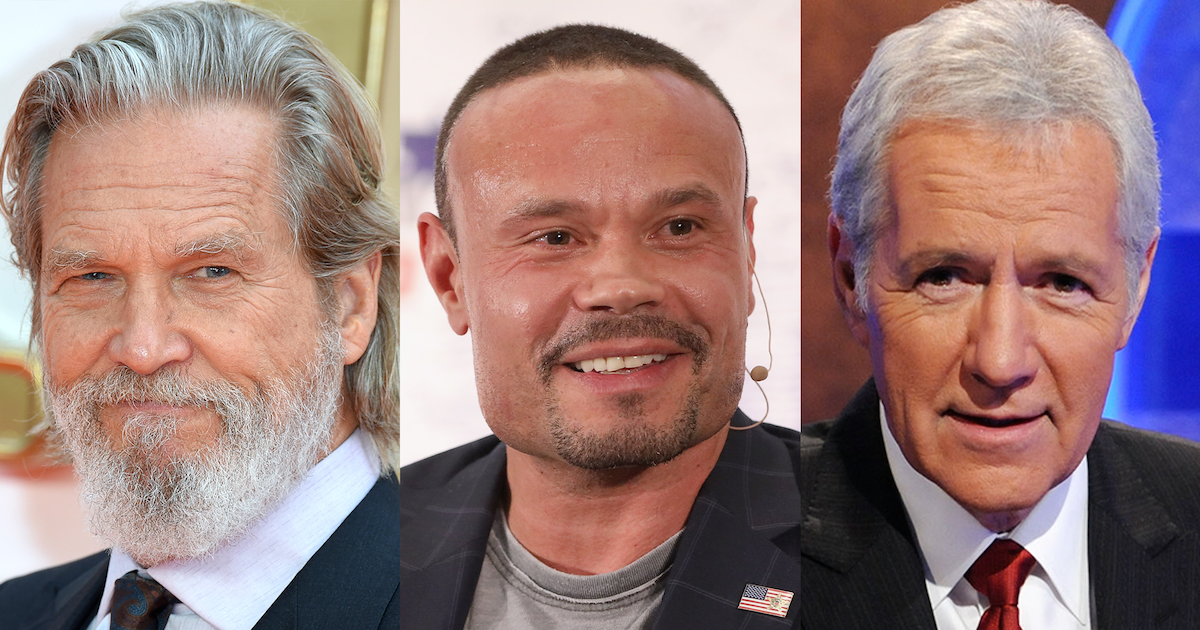Strong Men Speaking Out
- Men including Dan Bongino, Jeff Bridges, Alex Trebek, and Rush Limbaugh are battling cancer in the public eye.
- Public figures speaking out can raise awareness, and help people learn more about symptoms, risks, and screening.
- Talking about cancer can be difficult, but there can also be long-lasting benefits.
Alex Trebek’s Cancer Journey
In March 2019, Trebek announced to the world that he had been diagnosed with stage 4 pancreatic cancer. Since, he’s been keeping fans updated on his health through very special Jeopoardy! videos and raising awareness about the complex cancer. This past March, he celebrated hitting the one-year anniversary since his diagnosis, proudly stating he’s “beating the odds” since the one-year survival rate for pancreatic cancer patients is only 18%. Related: "Jeopardy" Viewer Says Alex Trebek 'Saved His Life' After He Caught His Pancreatic Cancer Early Thanks to Trebek Talking About SymptomsTrebek has had chemotherapy for treatment, and is currently undergoing an experimental therapy which has shown great promise. He’s openly talked about how chemotherapy impacted his mental health a lot, causing him to have dark days that made him want to quit fighting. However, he knew people were looking at him as an inspiration, and he continues to fight. Turns out, his honestly is saving lives in real time.
Dr. Allyson Ocean explains why pancreatic cancer is so hard to treat
Jeff Bridges’ Cancer Journey
Bridges announced in October that he had been diagnosed with lymphoma, although it’s still unclear what type, and is starting treatment. His news caused numerous blood cancer survivors to speak up, and remind him that this disease can be beaten. Last week, Bridges stepped up his visibility even more by creating an online journal on his website where he shares thoughts, treatment updates, and heartwarming hand-drawn doodles.
"This cancer is bringing on feelings of preciousness and gratitude and good old fashion love, lots of it, big time…This cancer is making me appreciate my mortality…I'm realizing I have sh*t to share, now's the time," Bridges writes in a post.
Dr. Elise Chong explains why your type of lymphoma matters
Dan Bongino’s Cancer Journey
While appearing on a Fox broadcast at the beginning of October, Bongino shared that he found a 10-centimeter by 7-centimeter tumor in his neck and had a biopsy to see if his health was in jeopardy. He initially assumed it was a lipoma (a fatty tumor that’s usually harmless), but it turns out that isn’t the case. After having surgery to remove the lump, his doctors diagnosed him with lymphoma. So far, Bongino hasn’t shared what type of lymphoma he is currently battling, or named specific treatment options he’s currently going through, but he’s still updated fans on how he’s doing emotionally.
“Something special is happening. Despite the bad health news, I've never felt more alive,” Bongino wrote on Twitter.
Dr. Jason Westin breaks down symptoms of lymphoma
Rush Limbaugh’s Cancer Journey
Radio personality Limbaugh, 69, has been battling stage 4 lung cancer since February. In the beginning, he kept his diagnosis out of the public eye, but recently he’s promised fans that he’d keep them more updated. In addition to sharing that he’s currently on his third-wave of treatment having previously gone through targeted therapies which he says “nearly killed him” he’s talked about the emotional toll this process has taken on him.
“I have vowed that I was not going to treat my lung cancer diagnosis as an opportunity to bleed on the audience, to either complain or constantly update," Limbaugh said on his radio show. "The reason for it is that, first and foremost, there's a radio show here to do each and every day, and that's why people tune in to listen to it…I just don't like to talk about it often 'cause I don't want to be a cancer patient on the radio."
Dr. Geoffrey Oxnard breaks down the definition of stage 4 lung cancer
Visibility Makes a Difference
Well-known figures speaking out about their cancer battle can make a long-lasting impact. By hearing their stories, it may increase the chances people will educate themselves about the disease and learn about risks, symptoms, and screening processes. After all, knowledge is power.
Learn more about SurvivorNet's rigorous medical review process.

